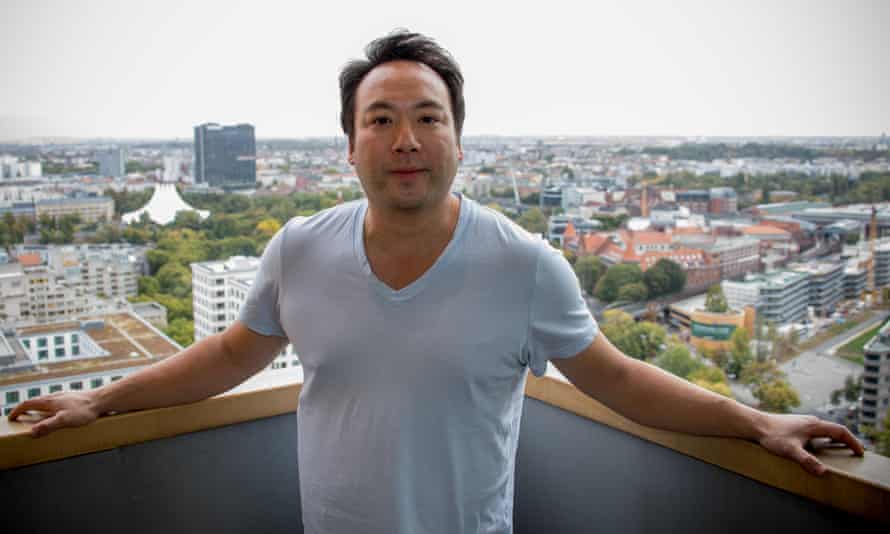Deliveroo: will 19 July serve up a big treat or slim pickings for food delivery app? | Deliveroo
Deliveroo’s army of riders, with the company’s distinctive turquoise food boxes strapped to their backs, have become a round-the-clock sight on Britain’s streets after the country developed a serious takeaway habit during the lockdowns of the past year.
But could England’s “freedom day” on Monday be the harbinger of leaner times? Some investors are concerned the takeaway boom will fizzle out, with rival Just Eat Takeaway’s shares falling sharply this week despite bumper orders in the first six months of 2021.
William Shu, the co-founder and chief executive of Deliveroo, doesn’t sound worried though. In a new podcast interview released this week, the US-born businessman says he is “super, super, super optimistic” about the future and how it can take a big slice of what is a £1.3tn market across the 12 countries where it operates. He also talks frankly on the The Diary of a CEO podcast about the company’s disastrous stock market debut, dubbed “flopperoo”, and how he knows “what riders want”.
The 41-year-old entrepreneur, who started the company with his childhood friend Greg Orlowski, says that although he doesn’t “really care what people think” about him – a quality that saw him dress up as a kangaroo to promote Deliveroo in the early days – the negative publicity around the initial public offering got to him.
With “every newspaper telling you, ‘you guys fucked up’. It was tough for a few weeks,” he says. However he remains focused on the business and doesn’t “think about the stock price”.
After plans for the spring share listing was unveiled, the company was beset by bad publicity, as City investors and campaign groups alike expressed concerns about the pay and conditions faced by Deliveroo’s self-employed riders, some of whom said in a survey that they in effect earn less than the minimum wage.
As a result some fund managers turned their nose up at its shares although the fact that Deliveroo still lost £224m in 2020, despite a captive audience for food deliveries, may have also been on their minds.
In the end the shares were priced at 390p, which was the bottom of the range set out at the start of the process. The first day’s trading was a calamity, with the shares tumbling 26% to 287p, although they have since recovered to change hands for 295p.
The pandemic has been a rollercoaster ride for Deliveroo which was pushed to the brink by the first original lockdown when restaurants were forced to turn off the lights. It was also held up by a lengthy Competition and Markets Authority probe into Amazon taking a minority stake in the business, a process Shu describes in the interview as “excruciating”.

The loss-making company needed the money and Shu seems confounded by the watchdog’s decision to investigate a “normal” deal that brought in a new shareholder. “These guys [the CMA] just went after this in an unprecedented way and we couldn’t get the capital in … that was utterly terrible.”
On the ongoing battle by some Deliveroo riders to gain legal status as employees, the former Morgan Stanley analyst insists he knows what it’s “like to walk in their shoes”.
Following the app’s 2013 launch, when it had only a handful of staff, he helped out with deliveries himself. That experience, he says, is “why treating riders with respect and making sure their voices are heard is so important to me. I talk to riders all the time. I know what they want”.
Even since this year’s listing, the businessman continues to go on regular undercover rides to check that the app works and restaurants are fulfilling their end of the bargain by handing over orders swiftly.
“I always test our rider app, so it’s a good way to do it,” he says, adding that it is a “decent way to get some exercise”. “You’re just on the road and you’re not thinking about anything else. I actually find it very relaxing.” It was also possible to learn a lot by seeing restaurants in action, he adds.
On his most recent shift he challenged staff for keeping him waiting and then handing over cold food, only to be told “just deliver it buddy”. Although riders recognise him, he says restaurant staff rarely do. He likes it that way because it means he knows “what the riders go through”.
Sign up to the daily Business Today email
The son of Taiwanese immigrants – his mother is a scientist at Yale and his father a retired actuary – also relates encountering discrimination as he and other riders, who were of Pakistani descent, sat around in a coffee shop waiting for jobs to come in.
“The same guy would kick us out every time,” he said. “The way that he looked at us, the way he looked at me, was like we were not people. The others were like whatever, who cares … and I wasn’t really used to it.”
As the remaining restrictions are lifted in England analysts are focused on how new freedoms will affect spending habits that were dramatically altered by the pandemic – and whether the Deliveroo habit will stick.
Source: theguardian.com

